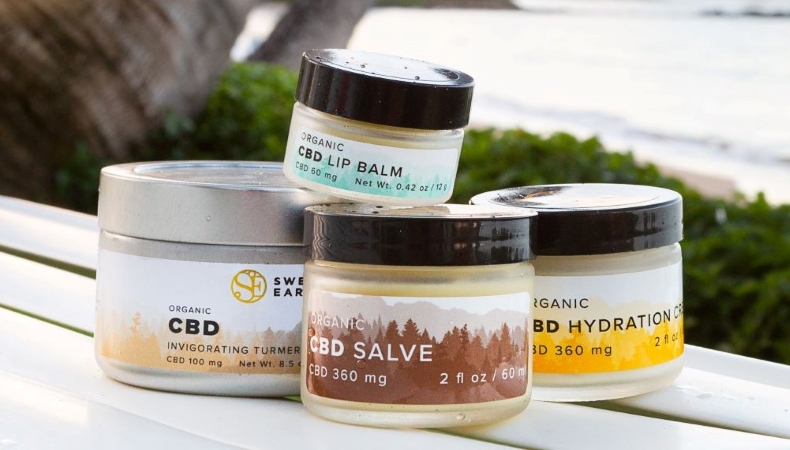To Reach Sweet Spot In CBD Topical Permeation, Sweet Earth Relies On Nanotechnology
Executive Summary
Sweet Earth conducts research with NAVCO Pharmaceuticals to confirm previous finding that beneficial effect of CBD is significantly impacted by skin permeation facilitated by nanotechnology. Canadian firm's CBD topicals are formulated with 70 nanometer particles.
The absence of a regulatory pathway in the US for sales of non-drug products containing hemp-derived cannabinoids isn’t stopping skin care marketers from innovating in the space, including Sweet Earth Holdings Corp. using nanotechnology to develop cannabidiol (CBD) isolates for better permeation.
The Canadian firm develops topicals that it claims, based on research, provide superior permeability with a CBD formulation using 70 nanometer (NM) particles.
“Other companies can claim they have 25% CBD in their body rub when in fact Sweet Earth’s 10% CBD provides much more relief because of the molecular size and how it combines with the cream that allows it to penetrate into the body’s pores for maximum benefit,” the Vancouver-based firm told HBW Insight.
Sweet Earth’s line launched in 2020 includes around 25 face, body, men’s grooming and hemp-based products in rubs, creams, salves and scrubs. Product prices range from $16 for a lip balm to $38 for CBD muscle rub and $42 for organic CBD salve.
Product claims include statements about balancing, nourishing and smoothing skin and muscles. On a question-and-answer page, Sweet Earth states that CBD “has been shown to have anti-inflammatory and analgesic properties.”
 Sweet Earth’s CBD line includes face, body and men’s grooming rubs, creams, salves and scrubs.
Source: Sweet Earth
Sweet Earth’s CBD line includes face, body and men’s grooming rubs, creams, salves and scrubs.
Source: Sweet Earth
Sweet Earth CEO Peter Espig says few other companies also are offering nano-sized particles in topical products and those use nanoparticles in the 150 NM range.
“What this means is more than double of the small molecule-CBD is able to penetrate into the muscle, which in turn makes it more effective,” Espig said in an email responding to HBW Insight's questions.
Permeability Research, Identifying ‘Key’ Therapeutic Claims
In August, Sweet Earth announced research with NAVCO Pharmaceuticals Ltd., a laboratory in Burlington, Ontario, to confirm previous findings that the beneficial effect of CBD is significantly impacted by skin permeation processes associated with nano-particle delivery systems.
“The current study involves in vitro skin permeation research to measure the performance of Sweet Earth Cream in the semisolid formulation,” it said in a release. “The aim is to evaluate the permeability of the cannabinoid compound into the skin, determine the optimal time for the cream absorption, identify the key therapeutic claims and discover the optimal amount of the cream to be used.”
The Sweet Earth/NAVCO study, which featured an hourly measure of the effectiveness over six hours, focused on penetration capabilities of the brand’s formulations on two membrane models: cellulose acetate with 0.45mm pore size and Strat-M synthetic, non-animal based transdermal diffusion.
Sweet Earth says the results provide “a vast and insightful amount of clinical data on the efficacy of our creams and muscle rubs, both of which are created for optimal bioavailability.”
Preliminary data show the firm’s cream permeates both types of membranes to reach a concentration that appears “to be more than adequate to induce a therapeutic effect.”
Additionally, the nanoparticle formulation “stabilizes CBD compounds over a period of time” making the product superior to peers in CBD topical products’ effectiveness, skin permeation and skin lipid stabilization, Espig said in an email.
“Many CBD creams on the market do not consider naturally present oils on the skin that contain a combination of saturated-, monounsaturated- and polyunsaturated-fatty acids of varying carbon chain lengths. These natural occurring florae alter the bioavailability of several of our peers’ cream function, thus reducing effectiveness,” he said.
Cumulative Exposure Less Concern With Topicals?
Even though hemp was de-scheduled as a controlled substance in the 2018 farm bill and sales of hemp- and cannabis-containing edible products and topicals have proliferated since states began legalizing medical and recreational use of marijuana in the early 2010s, under Food and Drug Administration rules those products are unlawful.
The FDA has been exercising enforcement discretion to allow sales of cannabinoid products that are made and marketed in compliance with its other relevant regulations. (Also see "FDA Road To Decision On Expanding CBD Uses Starts With Weighing Impact On Existing And Future Use As Drug" - HBW Insight, 2 Jun, 2019.)
 sweet earth ceo peter espig: "There’s going to come a time when the consumer gets more educated, the FDA will become more effective in the industry and more companies and their products will be backed by product research.”
Source: Sweet Earth
sweet earth ceo peter espig: "There’s going to come a time when the consumer gets more educated, the FDA will become more effective in the industry and more companies and their products will be backed by product research.”
Source: Sweet Earth
The agency has kept open a docket soliciting safety data, including accumulative exposure to cannabinoids across product categories – FDA-2019-N-1482.
Speaking at a consumer health industry conference on 9 September, acting Commissioner Janet Woodcock noted that a consumer’s exposure to CBD and other cannabinoids likely comes from using multiple products daily, including topicals as well as supplements and foods. (Also see "Measuring Consumer Exposure Confounds US FDA’s Evaluation Of Cannabinoid Safety In Supplements" - HBW Insight, 10 Sep, 2021.)
Espig says, though, it’s inaccurate to compare exposure from topicals with supplements, foods and beverages.
Cannabinoid exposure a consumer receives in a muscle rub or cream is “very different than taking one or two capsules over and over, which not only goes into your blood stream but hits your liver and kidneys as well,” he said.
“A lot of companies claim their products are able to provide positive health effects without having the research to back it up. We do lab research to make sure our products work safely. I absolutely agree with the FDA that more needs to be learned about the long-term effects of those CBD products,” he added.
The CEO said d FDA’s concerns about extended and overuse of CBD pertains “mainly to vape and ingestible products like gummies.” Vaping sends 100% of a product’s cannabinoid to a user’s lungs, but “the body “can only absorb a certain amount of cream, negating an overuse or overconsumption of CBD.”
He’s not holding his breath on FDA making lawful the use of cannabinoids in products other than drugs that are subject to its regulatory oversight.
“One reason is that the production of high-quality isolate is not as regulated as pharmaceutical products. There is risk here. I believe that state regulators will push for acceptance, starting with states that are classified as producers, and this will slowly spread,” Espig said.
He noted the FDA and states don’t have the same polices for hemp- or cannabis-derived ingredients, which can be taken naturally or created from synthetic yeasts. Most high-quality synthetic CBD is bio-identical to CBD, although the natural extract contains residual cannabinoids.
Hemp- or cannabis-derived ingredients are precluded from use in supplements sold in the US because synthetic 99% CBD extracted from hemp and cannabis plants approved as the active ingredient in an Rx drug indicated for a rare form of pediatric epilepsy and synthetic cannabis-based ingredients approved for drugs used for treatment of nausea and vomiting associated with cancer chemotherapy or treatment of anorexia associated with weight loss in patients with AIDS.
While the FDA’s docket targeted a potential rulemaking to waive the preclusion rule, agency officials have made clear since early in the process that legislation authorizing the change would be more efficient. Bills have been introduced in the House and Senate to exempt hemp-derived cannabinoids from the preclusion, though differences between them split support among supplement and hemp industry stakeholders. (Also see "Schumer Includes Cannabinoid Pathway For Supplements In Cannabis Legalization Draft Bill" - HBW Insight, 14 Jul, 2021.)
Despite regulatory uncertainty, ongoing research into efficacy and safety will ultimately create a regulatory path, Espig says.
“There’s going to come a time when the consumer gets more educated, the FDA will become more effective in the industry and more companies and their products will be backed by product research.”
Apply CBD Cosmetic Claims With Caution
Driven by burgeoning demand, cannabinoid-containing cosmetics have a clearer path to market compared to supplements, which cannot be formulated with investigational or approved drug ingredients unless those substances were available in foods or supplements before those uses.
Though cosmetic and skin care companies don’t face the same regulatory impediments as supplements, companies that market cannabinoid-containing supplements or cosmetics with claims for treating disease or impacting body structure or function run the risk of being warned by the FDA for selling unapproved drugs. Among dozens of warning letters, the agency recently warned a Wisconsin doctor about marketing cannabinoid-containing nasal sprays as unapproved new drugs. (Also see "Wisconsin Doctor’s CBD Nasal Sprays, Topical Offered OTC Diagnosed As Unapproved Drugs" - HBW Insight, 3 Aug, 2021.)
Among other nanotech CBD product marketers, Los Angeles firm Kush Queen recently debuted its Kingdm line of makeup with a product for deep delivery into skin. (Also see "CBD Pollinating New Beauty Categories With Cannabis Cachet: Sunscreens, Deodorants And More" - HBW Insight, 4 Sep, 2019.)
